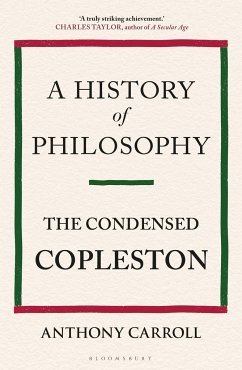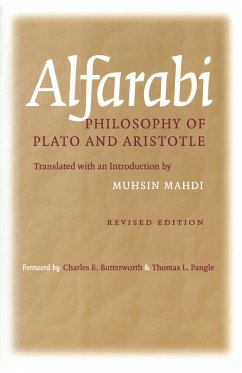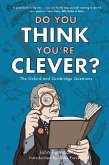- Gebundenes Buch
- Merkliste
- Auf die Merkliste
- Bewerten Bewerten
- Teilen
- Produkt teilen
- Produkterinnerung
- Produkterinnerung
This long-awaited single volume companion to Frederick Copleston's historic 11-volume series is a must-have for any aspiring philosopher.
Andere Kunden interessierten sich auch für
![Philosophy of Plato and Aristotle Philosophy of Plato and Aristotle]() AlfarabiPhilosophy of Plato and Aristotle30,99 €
AlfarabiPhilosophy of Plato and Aristotle30,99 €![Heidegger's Entscheidung Heidegger's Entscheidung]() Norman K. SwazoHeidegger's Entscheidung45,99 €
Norman K. SwazoHeidegger's Entscheidung45,99 €![Instant Philosophy Instant Philosophy]() Gareth SouthwellInstant Philosophy21,99 €
Gareth SouthwellInstant Philosophy21,99 €![Koresh Koresh]() Stephan TaltyKoresh11,99 €
Stephan TaltyKoresh11,99 €![Koresh Koresh]() Stephan TaltyKoresh35,99 €
Stephan TaltyKoresh35,99 €![Magnificent Rebels Magnificent Rebels]() Andrea WulfMagnificent Rebels23,99 €
Andrea WulfMagnificent Rebels23,99 €![Do You Think You're Clever? Do You Think You're Clever?]() John FarndonDo You Think You're Clever?16,99 €
John FarndonDo You Think You're Clever?16,99 €-
-
-
This long-awaited single volume companion to Frederick Copleston's historic 11-volume series is a must-have for any aspiring philosopher.
Produktdetails
- Produktdetails
- Verlag: Bloomsbury Publishing PLC
- Seitenzahl: 496
- Erscheinungstermin: 29. April 2025
- Englisch
- Abmessung: 238mm x 162mm x 44mm
- Gewicht: 734g
- ISBN-13: 9781472950765
- ISBN-10: 1472950763
- Artikelnr.: 70372279
- Herstellerkennzeichnung
- Libri GmbH
- Europaallee 1
- 36244 Bad Hersfeld
- gpsr@libri.de
- Verlag: Bloomsbury Publishing PLC
- Seitenzahl: 496
- Erscheinungstermin: 29. April 2025
- Englisch
- Abmessung: 238mm x 162mm x 44mm
- Gewicht: 734g
- ISBN-13: 9781472950765
- ISBN-10: 1472950763
- Artikelnr.: 70372279
- Herstellerkennzeichnung
- Libri GmbH
- Europaallee 1
- 36244 Bad Hersfeld
- gpsr@libri.de
Anthony J. Carroll is a philosopher, theologian and parish priest in Andalusia, Spain. His previous books include Protestant Modernity; Religion and Atheism: Beyond the Divide; and Modernity and Transcendence: A Dialogue with Charles Taylor. Frederick Copleston (died 1994) was Professor of the History of Philosophy and Dean of the Faculty of Theology at London University. His work A History of Philosophy is one of the most remarkable single-handed scholarly enterprises of modern times.
CHAPTER 1: THE HISTORY OF PHILOSOPHY
Why Study the History of Philosophy?
Why Study Copleston's A History of Philosophy?
Copleston's A History of Philosophy as Ignatian Humanism
How Should One Organize the History of Philosophy?
Postscript: A Short Biography of Frederick Charles Copleston
Bibliography
CHAPTER 2: GREECE AND ROME
Introduction
The Birth of Greek Philosophy
The Pioneers: The Philosophical Cosmologists of Ionia
The Socratic Period
Plato
Plato's Doctrine of the Forms
Aristotle's Metaphysics and Ethics
Post-Aristotelian Philosophy
Conclusion
Bibliography
CHAPTER 3: MEDIEVAL PHILOSOPHY
Introduction
Early Christian Thought in the Patristic Period
St Augustine and the City of God
The Pseudo-Dionysius
Boethius and the Consolation of Philosophy
The Carolingian Renaissance
John Scottus Eriugena
From the Tenth to the Twelfth Centuries
The Thirteenth Century Syntheses of Reason and Revelation
St Thomas Aquinas and the Great Synthesis of Faith and Reason
Scotus and the Franciscans
Conclusion
Bibliography
CHAPTER 4: LATE MEDIEVAL AND RENAISSANCE PHILOSOPHY
Introduction
William of Ockham and the end of the Great Synthesis of Faith and Reason
Marsilius of Padua on the Church and the State
Meister Eckhart and the Speculative Mysticism of the Fourteenth Century
The Philosophy of the Renaissance
Suárez and the Scholasticism of the Renaissance
Conclusion
Bibliography
CHAPTER 5: THE RATIONALISTS: DESCARTES TO LEIBNIZ
Introduction
Descartes on the Mind and the Body
Pascal, Cartesianism and Malebranche
Spinoza and the Philosophy of God or Nature
Leibniz and the Substance of Reality
Conclusion
Bibliography
CHAPTER 6: BRITISH PHILOSOPHY: HOBBES TO HUME
Introduction
Thomas Hobbes on Materialism, Mechanism and Power
John Locke and the Empirical Foundations of British Philosophy
Berkeley and the Lockean Legacy
David Hume and the Experience of Scepticism
Conclusion
Bibliography
CHAPTER 7: THE ENLIGHTENMENT: VOLTAIRE TO KANT
Introduction
Rousseau and the Origins of Society
The German Enlightenment and the Rise of the Philosophy of History
Kant and the Modern Vision of Reason
Kant on Morality and Religion
Aesthetics, Teleology and the Opus Postumum
Conclusion
Bibliography
CHAPTER 8: EIGHTEENTH- AND NINETEENTH-CENTURY GERMAN PHILOSOPHY: FICHTE TO
NIETZSCHE
Introduction
Fichte and the Fundamental Principles of Philosophy
Schelling and the Idea of Nature, Schleiermacher and the Feeling of
Dependence
Hegel and the Adventure of Spirit
Schopenhauer's Reaction Against the Transformations of Metaphysical
Idealism
Feuerbach's Turn to Anthropology
Marx and Engels and the Critique of Capitalism
Kierkegaard and the Search for Authenticity
Nietzsche and the Spiritual Crisis of Modernity
Conclusion: Retrospect and Prospect
Bibliography
CHAPTER 9: UTILITARIANISM AND EARLY ANALYTIC PHILOSOPHY
Introduction
The Utilitarianism of Jeremy Bentham and John Stuart Mill
The Legacy of British Empiricism and the Philosophy of Herbert Spencer
The Idealist Movement in Great Britain
Idealism in America
The Pragmatist Movement
The Revolt Against Idealism
Bertrand Russell and the Pursuit of a Logical and Scientific Philosophy
Conclusion
Bibliography
CHAPTER 10: NINETEENTH AND TWENTIETH CENTURY FRENCH PHILOSOPHY
Introduction
From the Revolution to Auguste Comte
From Auguste Comte to Henri Bergson
From Bergson to Sartre
Phenomenology and Structuralism
Conclusion
Bibliography
CHAPTER 11: RUSSIAN PHILOSOPHY
Introduction
Historical and philosophical themes
Peter Chaadaev: Philosophy and the Problem of Russia
Slavophile and Westernizing Developments
Literature, Religion and Philosophy: Dostoevsky, Tolstoy and Solovyov
Russian Marxism: Plekhanov, Lenin and the Soviet Union
Russian Philosophers in Exile and the Westernizer-Slavophile Legacy
Conclusion
Bibliography
CHAPTER 12: LOGICAL POSITIVISM AND EXISTENTIALISM
Introduction
Contemporary British Philosophy
Logical Positivism and Verification
Existentialism
Conclusion
Bibliography
CHAPTER 13: CONCLUSIONS, OMISSIONS AND PROSPECTS
Introduction
Habermas and the Unfinished Project of Modernity
MacIntyre on Virtue, Character and Community
Charles Taylor on the Self and Transcendence
Towards a Philosophy of the Future
Bibliography
Index
Why Study the History of Philosophy?
Why Study Copleston's A History of Philosophy?
Copleston's A History of Philosophy as Ignatian Humanism
How Should One Organize the History of Philosophy?
Postscript: A Short Biography of Frederick Charles Copleston
Bibliography
CHAPTER 2: GREECE AND ROME
Introduction
The Birth of Greek Philosophy
The Pioneers: The Philosophical Cosmologists of Ionia
The Socratic Period
Plato
Plato's Doctrine of the Forms
Aristotle's Metaphysics and Ethics
Post-Aristotelian Philosophy
Conclusion
Bibliography
CHAPTER 3: MEDIEVAL PHILOSOPHY
Introduction
Early Christian Thought in the Patristic Period
St Augustine and the City of God
The Pseudo-Dionysius
Boethius and the Consolation of Philosophy
The Carolingian Renaissance
John Scottus Eriugena
From the Tenth to the Twelfth Centuries
The Thirteenth Century Syntheses of Reason and Revelation
St Thomas Aquinas and the Great Synthesis of Faith and Reason
Scotus and the Franciscans
Conclusion
Bibliography
CHAPTER 4: LATE MEDIEVAL AND RENAISSANCE PHILOSOPHY
Introduction
William of Ockham and the end of the Great Synthesis of Faith and Reason
Marsilius of Padua on the Church and the State
Meister Eckhart and the Speculative Mysticism of the Fourteenth Century
The Philosophy of the Renaissance
Suárez and the Scholasticism of the Renaissance
Conclusion
Bibliography
CHAPTER 5: THE RATIONALISTS: DESCARTES TO LEIBNIZ
Introduction
Descartes on the Mind and the Body
Pascal, Cartesianism and Malebranche
Spinoza and the Philosophy of God or Nature
Leibniz and the Substance of Reality
Conclusion
Bibliography
CHAPTER 6: BRITISH PHILOSOPHY: HOBBES TO HUME
Introduction
Thomas Hobbes on Materialism, Mechanism and Power
John Locke and the Empirical Foundations of British Philosophy
Berkeley and the Lockean Legacy
David Hume and the Experience of Scepticism
Conclusion
Bibliography
CHAPTER 7: THE ENLIGHTENMENT: VOLTAIRE TO KANT
Introduction
Rousseau and the Origins of Society
The German Enlightenment and the Rise of the Philosophy of History
Kant and the Modern Vision of Reason
Kant on Morality and Religion
Aesthetics, Teleology and the Opus Postumum
Conclusion
Bibliography
CHAPTER 8: EIGHTEENTH- AND NINETEENTH-CENTURY GERMAN PHILOSOPHY: FICHTE TO
NIETZSCHE
Introduction
Fichte and the Fundamental Principles of Philosophy
Schelling and the Idea of Nature, Schleiermacher and the Feeling of
Dependence
Hegel and the Adventure of Spirit
Schopenhauer's Reaction Against the Transformations of Metaphysical
Idealism
Feuerbach's Turn to Anthropology
Marx and Engels and the Critique of Capitalism
Kierkegaard and the Search for Authenticity
Nietzsche and the Spiritual Crisis of Modernity
Conclusion: Retrospect and Prospect
Bibliography
CHAPTER 9: UTILITARIANISM AND EARLY ANALYTIC PHILOSOPHY
Introduction
The Utilitarianism of Jeremy Bentham and John Stuart Mill
The Legacy of British Empiricism and the Philosophy of Herbert Spencer
The Idealist Movement in Great Britain
Idealism in America
The Pragmatist Movement
The Revolt Against Idealism
Bertrand Russell and the Pursuit of a Logical and Scientific Philosophy
Conclusion
Bibliography
CHAPTER 10: NINETEENTH AND TWENTIETH CENTURY FRENCH PHILOSOPHY
Introduction
From the Revolution to Auguste Comte
From Auguste Comte to Henri Bergson
From Bergson to Sartre
Phenomenology and Structuralism
Conclusion
Bibliography
CHAPTER 11: RUSSIAN PHILOSOPHY
Introduction
Historical and philosophical themes
Peter Chaadaev: Philosophy and the Problem of Russia
Slavophile and Westernizing Developments
Literature, Religion and Philosophy: Dostoevsky, Tolstoy and Solovyov
Russian Marxism: Plekhanov, Lenin and the Soviet Union
Russian Philosophers in Exile and the Westernizer-Slavophile Legacy
Conclusion
Bibliography
CHAPTER 12: LOGICAL POSITIVISM AND EXISTENTIALISM
Introduction
Contemporary British Philosophy
Logical Positivism and Verification
Existentialism
Conclusion
Bibliography
CHAPTER 13: CONCLUSIONS, OMISSIONS AND PROSPECTS
Introduction
Habermas and the Unfinished Project of Modernity
MacIntyre on Virtue, Character and Community
Charles Taylor on the Self and Transcendence
Towards a Philosophy of the Future
Bibliography
Index
CHAPTER 1: THE HISTORY OF PHILOSOPHY
Why Study the History of Philosophy?
Why Study Copleston's A History of Philosophy?
Copleston's A History of Philosophy as Ignatian Humanism
How Should One Organize the History of Philosophy?
Postscript: A Short Biography of Frederick Charles Copleston
Bibliography
CHAPTER 2: GREECE AND ROME
Introduction
The Birth of Greek Philosophy
The Pioneers: The Philosophical Cosmologists of Ionia
The Socratic Period
Plato
Plato's Doctrine of the Forms
Aristotle's Metaphysics and Ethics
Post-Aristotelian Philosophy
Conclusion
Bibliography
CHAPTER 3: MEDIEVAL PHILOSOPHY
Introduction
Early Christian Thought in the Patristic Period
St Augustine and the City of God
The Pseudo-Dionysius
Boethius and the Consolation of Philosophy
The Carolingian Renaissance
John Scottus Eriugena
From the Tenth to the Twelfth Centuries
The Thirteenth Century Syntheses of Reason and Revelation
St Thomas Aquinas and the Great Synthesis of Faith and Reason
Scotus and the Franciscans
Conclusion
Bibliography
CHAPTER 4: LATE MEDIEVAL AND RENAISSANCE PHILOSOPHY
Introduction
William of Ockham and the end of the Great Synthesis of Faith and Reason
Marsilius of Padua on the Church and the State
Meister Eckhart and the Speculative Mysticism of the Fourteenth Century
The Philosophy of the Renaissance
Suárez and the Scholasticism of the Renaissance
Conclusion
Bibliography
CHAPTER 5: THE RATIONALISTS: DESCARTES TO LEIBNIZ
Introduction
Descartes on the Mind and the Body
Pascal, Cartesianism and Malebranche
Spinoza and the Philosophy of God or Nature
Leibniz and the Substance of Reality
Conclusion
Bibliography
CHAPTER 6: BRITISH PHILOSOPHY: HOBBES TO HUME
Introduction
Thomas Hobbes on Materialism, Mechanism and Power
John Locke and the Empirical Foundations of British Philosophy
Berkeley and the Lockean Legacy
David Hume and the Experience of Scepticism
Conclusion
Bibliography
CHAPTER 7: THE ENLIGHTENMENT: VOLTAIRE TO KANT
Introduction
Rousseau and the Origins of Society
The German Enlightenment and the Rise of the Philosophy of History
Kant and the Modern Vision of Reason
Kant on Morality and Religion
Aesthetics, Teleology and the Opus Postumum
Conclusion
Bibliography
CHAPTER 8: EIGHTEENTH- AND NINETEENTH-CENTURY GERMAN PHILOSOPHY: FICHTE TO
NIETZSCHE
Introduction
Fichte and the Fundamental Principles of Philosophy
Schelling and the Idea of Nature, Schleiermacher and the Feeling of
Dependence
Hegel and the Adventure of Spirit
Schopenhauer's Reaction Against the Transformations of Metaphysical
Idealism
Feuerbach's Turn to Anthropology
Marx and Engels and the Critique of Capitalism
Kierkegaard and the Search for Authenticity
Nietzsche and the Spiritual Crisis of Modernity
Conclusion: Retrospect and Prospect
Bibliography
CHAPTER 9: UTILITARIANISM AND EARLY ANALYTIC PHILOSOPHY
Introduction
The Utilitarianism of Jeremy Bentham and John Stuart Mill
The Legacy of British Empiricism and the Philosophy of Herbert Spencer
The Idealist Movement in Great Britain
Idealism in America
The Pragmatist Movement
The Revolt Against Idealism
Bertrand Russell and the Pursuit of a Logical and Scientific Philosophy
Conclusion
Bibliography
CHAPTER 10: NINETEENTH AND TWENTIETH CENTURY FRENCH PHILOSOPHY
Introduction
From the Revolution to Auguste Comte
From Auguste Comte to Henri Bergson
From Bergson to Sartre
Phenomenology and Structuralism
Conclusion
Bibliography
CHAPTER 11: RUSSIAN PHILOSOPHY
Introduction
Historical and philosophical themes
Peter Chaadaev: Philosophy and the Problem of Russia
Slavophile and Westernizing Developments
Literature, Religion and Philosophy: Dostoevsky, Tolstoy and Solovyov
Russian Marxism: Plekhanov, Lenin and the Soviet Union
Russian Philosophers in Exile and the Westernizer-Slavophile Legacy
Conclusion
Bibliography
CHAPTER 12: LOGICAL POSITIVISM AND EXISTENTIALISM
Introduction
Contemporary British Philosophy
Logical Positivism and Verification
Existentialism
Conclusion
Bibliography
CHAPTER 13: CONCLUSIONS, OMISSIONS AND PROSPECTS
Introduction
Habermas and the Unfinished Project of Modernity
MacIntyre on Virtue, Character and Community
Charles Taylor on the Self and Transcendence
Towards a Philosophy of the Future
Bibliography
Index
Why Study the History of Philosophy?
Why Study Copleston's A History of Philosophy?
Copleston's A History of Philosophy as Ignatian Humanism
How Should One Organize the History of Philosophy?
Postscript: A Short Biography of Frederick Charles Copleston
Bibliography
CHAPTER 2: GREECE AND ROME
Introduction
The Birth of Greek Philosophy
The Pioneers: The Philosophical Cosmologists of Ionia
The Socratic Period
Plato
Plato's Doctrine of the Forms
Aristotle's Metaphysics and Ethics
Post-Aristotelian Philosophy
Conclusion
Bibliography
CHAPTER 3: MEDIEVAL PHILOSOPHY
Introduction
Early Christian Thought in the Patristic Period
St Augustine and the City of God
The Pseudo-Dionysius
Boethius and the Consolation of Philosophy
The Carolingian Renaissance
John Scottus Eriugena
From the Tenth to the Twelfth Centuries
The Thirteenth Century Syntheses of Reason and Revelation
St Thomas Aquinas and the Great Synthesis of Faith and Reason
Scotus and the Franciscans
Conclusion
Bibliography
CHAPTER 4: LATE MEDIEVAL AND RENAISSANCE PHILOSOPHY
Introduction
William of Ockham and the end of the Great Synthesis of Faith and Reason
Marsilius of Padua on the Church and the State
Meister Eckhart and the Speculative Mysticism of the Fourteenth Century
The Philosophy of the Renaissance
Suárez and the Scholasticism of the Renaissance
Conclusion
Bibliography
CHAPTER 5: THE RATIONALISTS: DESCARTES TO LEIBNIZ
Introduction
Descartes on the Mind and the Body
Pascal, Cartesianism and Malebranche
Spinoza and the Philosophy of God or Nature
Leibniz and the Substance of Reality
Conclusion
Bibliography
CHAPTER 6: BRITISH PHILOSOPHY: HOBBES TO HUME
Introduction
Thomas Hobbes on Materialism, Mechanism and Power
John Locke and the Empirical Foundations of British Philosophy
Berkeley and the Lockean Legacy
David Hume and the Experience of Scepticism
Conclusion
Bibliography
CHAPTER 7: THE ENLIGHTENMENT: VOLTAIRE TO KANT
Introduction
Rousseau and the Origins of Society
The German Enlightenment and the Rise of the Philosophy of History
Kant and the Modern Vision of Reason
Kant on Morality and Religion
Aesthetics, Teleology and the Opus Postumum
Conclusion
Bibliography
CHAPTER 8: EIGHTEENTH- AND NINETEENTH-CENTURY GERMAN PHILOSOPHY: FICHTE TO
NIETZSCHE
Introduction
Fichte and the Fundamental Principles of Philosophy
Schelling and the Idea of Nature, Schleiermacher and the Feeling of
Dependence
Hegel and the Adventure of Spirit
Schopenhauer's Reaction Against the Transformations of Metaphysical
Idealism
Feuerbach's Turn to Anthropology
Marx and Engels and the Critique of Capitalism
Kierkegaard and the Search for Authenticity
Nietzsche and the Spiritual Crisis of Modernity
Conclusion: Retrospect and Prospect
Bibliography
CHAPTER 9: UTILITARIANISM AND EARLY ANALYTIC PHILOSOPHY
Introduction
The Utilitarianism of Jeremy Bentham and John Stuart Mill
The Legacy of British Empiricism and the Philosophy of Herbert Spencer
The Idealist Movement in Great Britain
Idealism in America
The Pragmatist Movement
The Revolt Against Idealism
Bertrand Russell and the Pursuit of a Logical and Scientific Philosophy
Conclusion
Bibliography
CHAPTER 10: NINETEENTH AND TWENTIETH CENTURY FRENCH PHILOSOPHY
Introduction
From the Revolution to Auguste Comte
From Auguste Comte to Henri Bergson
From Bergson to Sartre
Phenomenology and Structuralism
Conclusion
Bibliography
CHAPTER 11: RUSSIAN PHILOSOPHY
Introduction
Historical and philosophical themes
Peter Chaadaev: Philosophy and the Problem of Russia
Slavophile and Westernizing Developments
Literature, Religion and Philosophy: Dostoevsky, Tolstoy and Solovyov
Russian Marxism: Plekhanov, Lenin and the Soviet Union
Russian Philosophers in Exile and the Westernizer-Slavophile Legacy
Conclusion
Bibliography
CHAPTER 12: LOGICAL POSITIVISM AND EXISTENTIALISM
Introduction
Contemporary British Philosophy
Logical Positivism and Verification
Existentialism
Conclusion
Bibliography
CHAPTER 13: CONCLUSIONS, OMISSIONS AND PROSPECTS
Introduction
Habermas and the Unfinished Project of Modernity
MacIntyre on Virtue, Character and Community
Charles Taylor on the Self and Transcendence
Towards a Philosophy of the Future
Bibliography
Index








